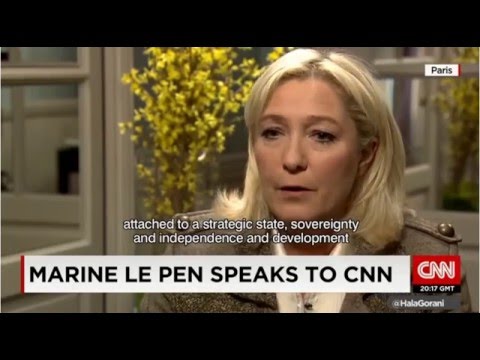Just a fortnight into his presidency, Donald Trump has scored one clear success. He has inspired Marine Le Pen, the extreme right cougar of French politics, to launch a Presidential bid patterned on his slogan of making France great again. She promises to snatch power away from the “wealthy elites” of both right and left.
Like him, she wants to return political power to the working women and men who allegedly lost their livelihoods to immigrants and third world factory workers. She wants to keep Muslim refugees out of France and withdraw her country from both the European Union and NATO within a year of being named President.
Trump cold-shouldered her when he was president-elect. She hovered in the Trump Tower lobby for a while in a bid to meet him. She returned to France claiming he is a kindred spirit.
She held a glamorous rally of her National Front Party in Lyon this week end, where a camera caught her making an unfortunate raised-arm salute reminiscent of the National Socialist gesture of the 1930s.
Her platform is a curious mixed salad of Marxist and National Socialist ideas, dipped in an understated but clearly discernable anti-Semitic vinegar. She tends to flip-flop and it is hard to know whether she believes what she says or goes with whatever she thinks might work the crowd before her.
She does have a clear “the French first” line but how that might be achieved seems to vary. Trump inspires her probably because she sees what she wants to see and hears what she wants to hear. Trump is a unique phenomenon of US politics. She pretends he is transferable to France’s terrain, like McDonalds or Starbucks.
“If Donald Trump can make it against all odds, so can I and so can we,” she cried to cheering supporters, after warming them up with loud bands in a Party rally uncharacteristic for France but patterned on political Conventions in America.
Recent polls put support for her at 40 percent, which is way above past showings that hovered at 18 to 26 per cent for years. To some extent, the higher ratings reflect a “Trump effect” on French politics of his vigorous campaign and victory last November.
But Trump’s executive orders since inauguration have scared a lot of people in France and Europe, who were leaning far right but might prefer the center right now.
Perhaps unfairly, he is perceived as a racist anti-Muslim and that scares Europeans, especially the French. They have lived cheek-by-jowl with Muslims for centuries and colonized some of them for long periods. They find it hard to see Islam as evil.
Many might resent Muslims but few hate them and hardly anyone wants to tar all Muslims as jihadists bent on killing innocent people in France and Europe. France has suffered the most from radical Islamist jihadism in recent years but even Le Pen’s supporters do not want witch-hunts and pogroms against Muslims in the name of fighting radical Islam inside France.
There is a strong case to believe that Trump is also not anti-Muslim despite his regularly infelicitous choice of words in promising safety to Americans from terrorists.
But people abroad are too unfamiliar with Americans to notice the details of his way with words. European versions of American white supremacists quickly grab his worst phrases and claim him as their own. They deliberately distort Trump’s intentions since he has not openly had truck with white supremacists anywhere.
Le Pen is less like maverick Trump in her political history and more like Hillary Clinton. She is an experienced and opportunistic politician used to being a regular pugilist on French political circuits for over three decades. She is not a new meteor on the firmament.
Her nationalist “The French first” exhortations were stuck in the 20 percent approval bracket for decades. Trump’s sudden triumphs in America’s harsh politics put new wind in her sails. Now, she speaks much more bluntly and with passionate conviction about how being patriotic and looking inward are noble missions rather than narrow-minded egotism.
At her latest rallies, she declares that the choice the French will face in presidential polls on April 23 will be between being global or being patriotic. She prefers patriotism but goes beyond Trump’s radicalism to take France out of the EU, which would decimate European unity, and out of NATO, which would seriously weaken the alliance.
Despite her rising approval ratings, her opponents now hope Trump’s behavior in the White House will disturb enough people in France for them to turn away from her hard-right ideas. They are pushing a more moderate rightist vision, led by Francois Fillon, and a pro-European centrist vision led by Emmanuel Macron.
Support for either could defeat Le Pen in the second round of polls on May 7.
n

















